Ikaranara (Pacifica)
The Federated Empires of Ikaranara En Inkamten Markeai e Ikaranara Ikaranara | |
|---|---|
| 1955 (End of Great War )–Ongoing | |
|
Flag | |
Motto: Asan tavi monga a axaltra. With our glory and shield. | |
| Capital | Centrus City |
| Largest city | Akeros |
| Recognized national languages | Austral, Indavral |
| Ethnic groups | 32% Narussian
30% Ranarasi 26% Ikarnian 10% Aldranic 8% Tzaran 3.5% other 1.5% Aslanvral
|
| Religion | 96.68% Bvarai
2.12% Christianity 2.2% Other |
| Demonym(s) | Ikaranarean Ikarevêro (Indavral) |
| Government | Parliamentary Democracy |
• Head Governor | Garovo Alertz |
| Legislature | The National Assembly (NA) |
| History | |
• Established | 1955 (End of Great War ) |
• Disestablished | Ongoing |
| Area | |
• Total | 206,716 km2 (79,813 sq mi) |
| Population | |
• Census | 75,723,821 |
• Density | 365.02/km2 (945.4/sq mi) |
| GDP (nominal) | 3,614,297,976,330 estimate |
• Per capita | 47,730 |
| Currency | Tiradon |
The Federated Empires of Ikaranara is a northern Cordilian state in between Ryccia and Past, with the Kingdom of Nölvra bordering Besern. It was created after a period of isolation after rebelling from three nations that were known as Ikarn, Narus and Ranaras, collectively known as the Father States. Some Ikaranareans still believe in the Father States' legitimacy. Those who do are referred to as Re-instatists, and they may refer to Ikaranara as the Allied States rather than the Federation. For this reason, those harboring Re-instatist ideals are typically ostracized from governmental positions.
HISTORY
Ancient history (600 B.C.E to 425 A.D)
First development
Ikaranara was originally three tribes in southern Ryccia. They sustained minor influence before being pushed out south in around 600 B.C.E- this is considered the start of Ikaranarean history. Interestingly this happened centuries before most of what happened in 1000-1600 A.D.
Early trade
When the tribes called Ikarn, Ranara and Naru arrived in the Indavral Region, they became very close and intertwined with trade. The most valuable resourve at the time was owned by the Naru- salt. For centuries the Naru dominated trade. The Ikarn were known for their military might. Their place earned them the nickname: Defender of the Alliance. The Ranara had a lot of people, and a lot of industry, with factory-like places showing up in the Ranara region dated to as long ago as 400 A.D.

The Triangular Alliance
The three tribes dominated Indavra by this formal alliance. The terms of it were simple: The tribes agreed to a permanent armistice, and if one tribe needed something they would prioritize getting it form one of the Triangular tribes. This led to an amount of organization and trade not seen in the other tribes. The Triangular Alliance would prove to be an effective system until the early 1400s, as the tribes grew more powerful and more interconnected.
The Trikaard War (422-425 A.D)
Main: The Trikaraad War (Pacifica)
The Trikaard War was the first major Ikaranarean war in the Indavral reigion. The war was fought by the Triangular Tribes and a loose coalition of tribes: the Ivaraad, the Kekera, the Valira, and the Nena. The Ikaranarean tribes eventually won the war, and two tribes: the weaker Kekera and Nena were assimilated into Ikaranarean territory. The Valira were forced to flee on ships to an unknown fate. The full out annexation of two tribes in the Indavral reigion came to be known as the start of the Ikaranarean Supremacy.
Government Structure
The government of Ikaranara is divided into a traditional tripartite separation of powers, between the Legislature, Judiciary, and Executive.
Executive
The executive branch is led by the Head Governor, who is taken from a list chosen by the Caunsakoi (Assemblypeople) of the ruling party of the National Assembly (Kamarkata Caunsa). The Head Governor is then voted on by the Ikaranarean people- if they do not the approval voting, another member must be picked. The Head Governor oversees the military as the commander-in-chief, having an absolute veto on military legislation- all of their other vetos can be overridden with a 3/5 majority. The Executive also has the power to create Executive Mandates, determining the internal affairs of the government. The executive is also responsible for
Legislative
The National Assembly is the only legislative entity in Ikaranara. It creates all laws and is responsible for ratifying international treaties with the force of law- it also sets national tax rates and trade tarrifs. The National Assembly is currently made of 735 seats, this is changed every 5 years to keep the ratio of seats to citizens at roughly 1 seat per every 100,000 people. Every 2 years, there is an Assembly Election across the nation, where all eligible citizens are able to vote to change who sits on the council. In the election process, people vote for parties initially, determining what party gets what seats. In all election districts. Parties then hold internal elections called Determining Votes which decides who exactly will sit on each seat through a process of elimination, eliminating the people with the lowest amount of votes.
In the National Assembly, the Ruling Party- the party with the most seats- chooses a Speaker of the Assembly, and then they are voted on by the Assembly, with a 3/5 majority being needed to accept them. The Speaker of the Assembly maintains order in the Assembly and presides over its affairs, being responsible for reading out the results of votes.

The Ikaranareans are dominated by the United Ikaranara Party (UIP) which is a slightly left of center but still nationalist party, advocating for Ikaranara to act internationally to keep its best interests like trade and regional stability afloat. The main opposition is the Social Ikaranareans (SI) which are a much more liberal party advocating for Ikaranara to take a bigger role in fostering a better Pacifica with international aid. The third biggest party is the Grand Ikaranara Party (GIP) which is a heavily nationalist and right of center party who advocates for more isolationist measures, advocating for focus only in Indavra and the Bay of Spiders.
Judicial
The Ikaranarean Supreme Court is the highest court in Ikaranara. It has 11 justices, appointed by the Head Governor and approved by the National Assembly. The Supreme Court has the power of judicial review, allowing them to strike down laws and executive orders deemed unconstitutional. Additionally, the Supreme Court provides over cases of crimes committed by Caunsakoi or other high-ranking government members to see if their guilt (if proven) renders them unable to continue to serve.
Politics
Ikaranara is an extremely nationalist nation. For this reason, it's said that all of the major parties in the National Assembly have some element of nationalism to them. Ikaranara is more liberal than the other two Indavral nations, although Losavra is considered to be more liberal than Past. The leading party is the United Ikarananara party, led by Garovo Alertz.
Foreign Relations
Ikarnara fosters generally good relations with most foreign nations, and maintains at least one embassy in every nation which allows it to, mainly for trade reasons. Relations with Ryccia have however been poor since the outbreak of the Ryccian Military Junta and the eventual Rycco-Cordilian War, however, relations have been improving with the new Ryccian government at a gradual pace. The three Indavral nations share extremely cordial relations after the War in Past and are known to act together.
Economy
Exports
Ikaranara's economy is primarily based on the exportation of natural resources like oil. To this end, the major industries all rely on extracting and refining raw materials like steel, rare earth metals and others. Ikaranara, due to eyes pointed at it because of the impact its oil exports could have on the climate, has recently tried to start moving away from these practices, however, attempting to get into more service industries and other, more sustainable industries.
Imports
Ikaranara's main imports include raw materials it lacks, certain foods it does not generally produce, and manufactured machine parts, the last being its main import. One of the most common Ikaranarean trades is to trade a surplus of raw materials in exchange for things made with those raw materials, leaving a little extra in the hands of the party they traded with.
